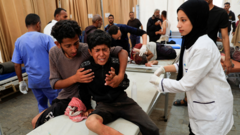Israel's renewed military campaign against Iran indicates a strategic pivot, as it openly conducts operations long threatened but rarely executed. This shift aims to redefine balance and assert dominance within the Middle East, though the ultimate impact on Iran's nuclear program remains uncertain.
Israel's Aggressive Shift in Military Strategy Marks New Era in Middle Eastern Conflicts

Israel's Aggressive Shift in Military Strategy Marks New Era in Middle Eastern Conflicts
The Israel-Iran conflict embodies a significant transformation in military doctrine and regional power dynamics following the October 2023 attacks.
Article Text:
For years, Israel exercised restraint in its confrontations with persistent adversaries like Tehran, Hamas, and Hezbollah. Historically, it maintained deep-seated conflicts with these entities while refraining from full-scale warfare. Recently, however, the dynamics have shifted dramatically. Israel's expansive and unrelenting assault on Iran showcases a newfound boldness in its military doctrine, triggered significantly by the coordinated attack from Hamas on October 7, 2023.
In the past, Israel engaged in limited skirmishes with Hamas, allowing the group to maintain governmental control in Gaza, and it cultivated an uneasy detente with Hezbollah, amidst their fortified positions in southern Lebanon. However, following the Hamas onslaught, Israel has adopted a more aggressive stance, launching an unprecedented offensive that has reconfigured the regional balance of power, dismantling Iran's influence and asserting Israel's military supremacy.
Prime Minister Benjamin Netanyahu emphasized this transformative moment during a recent press briefing. "We are changing the face of the Middle East," he stated, suggesting that the implications of these military actions could extend far beyond regional boundaries, potentially reshaping Iran's internal structure as well.
Despite these ambitious goals, critical outcomes remain up in the air. Israel's military advancements have clearly weakened Iran’s position, but the campaign has yet to achieve the complete destruction of its nuclear capabilities or lead to a governmental collapse. This ongoing conflict raises concerns about evolving into a protracted engagement without a clear resolution in sight.
Images of citizens in Tehran waiting for gas reveal the domestic impacts of the conflict, signaling that while military operations intensify, public sentiment and infrastructural resilience hang in balance. The war marks a turning point, not just for Israel but for the entire Middle East landscape, as both political mechanisms and military strategies undergo radical transformations.
For years, Israel exercised restraint in its confrontations with persistent adversaries like Tehran, Hamas, and Hezbollah. Historically, it maintained deep-seated conflicts with these entities while refraining from full-scale warfare. Recently, however, the dynamics have shifted dramatically. Israel's expansive and unrelenting assault on Iran showcases a newfound boldness in its military doctrine, triggered significantly by the coordinated attack from Hamas on October 7, 2023.
In the past, Israel engaged in limited skirmishes with Hamas, allowing the group to maintain governmental control in Gaza, and it cultivated an uneasy detente with Hezbollah, amidst their fortified positions in southern Lebanon. However, following the Hamas onslaught, Israel has adopted a more aggressive stance, launching an unprecedented offensive that has reconfigured the regional balance of power, dismantling Iran's influence and asserting Israel's military supremacy.
Prime Minister Benjamin Netanyahu emphasized this transformative moment during a recent press briefing. "We are changing the face of the Middle East," he stated, suggesting that the implications of these military actions could extend far beyond regional boundaries, potentially reshaping Iran's internal structure as well.
Despite these ambitious goals, critical outcomes remain up in the air. Israel's military advancements have clearly weakened Iran’s position, but the campaign has yet to achieve the complete destruction of its nuclear capabilities or lead to a governmental collapse. This ongoing conflict raises concerns about evolving into a protracted engagement without a clear resolution in sight.
Images of citizens in Tehran waiting for gas reveal the domestic impacts of the conflict, signaling that while military operations intensify, public sentiment and infrastructural resilience hang in balance. The war marks a turning point, not just for Israel but for the entire Middle East landscape, as both political mechanisms and military strategies undergo radical transformations.






















